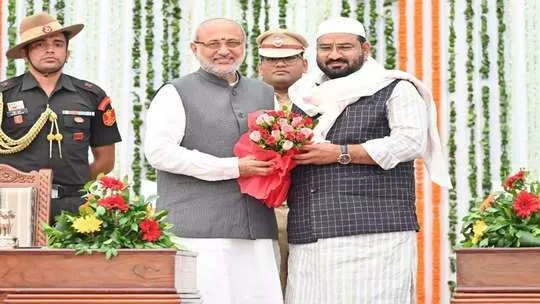In Jharkhand, a heated debate has erupted following the oath-taking ceremony of Hafizuuddin Ansari, a minister in the state cabinet. The controversy centers on Ansari’s inclusion of religious texts at the beginning of his oath during the cabinet expansion on July 8. This incident has ignited a fierce political dispute, with opposing parties taking strong stances. The religious nature of the oath has become a focal point for criticism and defense alike.
BJP’s Religious Objections
The Bharatiya Janata Party (BJP) has strongly criticized Ansari’s actions, claiming they violate constitutional norms. Hemanta Biswa Sharma, Assam’s Chief Minister and co-in-charge of Jharkhand for the upcoming assembly elections, questioned the validity of such oath-taking practices. “Do ministers take oath like this in the state of Jharkhand?” Sharma asked, highlighting the religious aspect of the incident.
Furthermore, the BJP has taken formal steps to address the issue. Amar Kumar Bauri, the Leader of Opposition in Jharkhand, has requested the governor not to allow Ansari to take charge, arguing that the oath is invalid and unconstitutional due to its religious content. This move underscores the BJP’s stance on maintaining secular practices in official ceremonies.
JMM’s Defense and Counterclaims
On the other hand, the Jharkhand Mukti Morcha (JMM) has dismissed the BJP’s concerns. They argue that the opposition is manufacturing controversy due to a lack of substantive issues ahead of the elections.
In a sharp rebuttal, the JMM accused the BJP of stooping to divisive politics. They questioned why taking an oath in the name of God, Ishwar, Allah, or Jesus should be problematic. The party also highlighted a case where a minister at the Centre took oath without mentioning God, yet faced no objections from the BJP.
Religious Implications and Constitutional Concerns
The incident raises important questions about the intersection of religion and politics in India. While some view the inclusion of religious elements in official ceremonies as a reflection of personal faith, others see it as a potential threat to secular governance. This debate highlights the delicate balance between religious freedom and constitutional obligations in Indian politics.
The controversy also brings to light the broader issue of religious representation in public office. As India is a diverse country with multiple faiths, the role of religion in political processes continues to be a sensitive and debated topic.
Notably, this is not the first time Hafizul Hasan has been involved in controversy. Previous incidents, including a viral video showing him adjusting his scarf during the national anthem, have also drawn public attention. These events underscore the ongoing tensions surrounding religious expression in political spaces.
The repeated controversies involving Hasan raise questions about the impact of such incidents on public perception and political discourse. As religious sensitivities continue to play a significant role in Indian politics, incidents like these may have far-reaching consequences for both individual politicians and their parties.
Upcoming Elections and Political Landscape
As Jharkhand prepares for assembly elections in the coming months, this religious controversy adds another layer of complexity to an already charged political atmosphere. The recent developments, including Chief Minister Hemant Soren’s bail in a money laundering case, have further intensified the political climate.
The oath-taking incident may well become a talking point in the upcoming election campaigns. Both the BJP and the JMM are likely to use this controversy to appeal to their respective voter bases, potentially making religious issues a key theme in the electoral discourse.
Constitutional Considerations
The controversy also brings into focus the constitutional provisions regarding oath-taking for public officials. While the Constitution of India provides for freedom of religion, it also emphasizes the secular nature of the state. This incident may prompt a renewed examination of the guidelines for oath-taking ceremonies and their interpretation in light of India’s secular principles.
Conclusion
The oath-taking controversy in Jharkhand serves as a reminder of the complex interplay between religion, politics, and constitutional norms in India. As the state moves closer to elections, it remains to be seen how this incident will influence the political landscape and voter sentiments.
ALSO READ: Significance of Indian Prime Minister’s visit to Austria after 40 years
